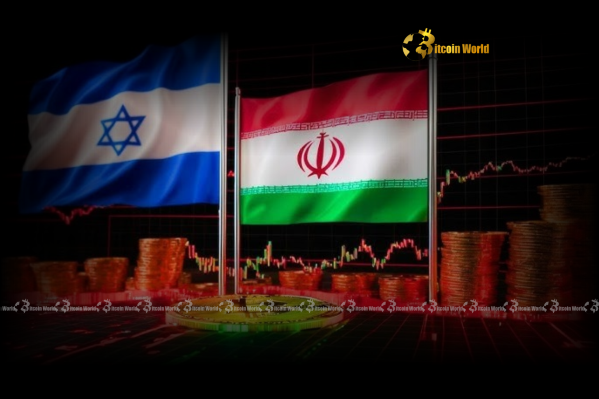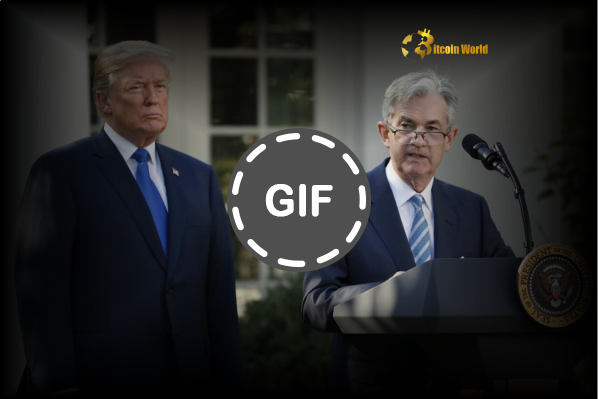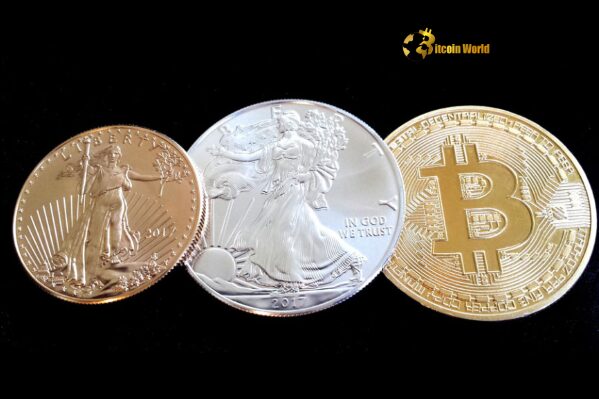BitcoinWorld

Israel Iran Conflict: Navigating the Crisis of Escalation and Crypto Volatility
The world watches with bated breath as the long-simmering tensions between Israel and Iran erupt into direct conflict, now involving the United States. This dangerous escalation, marked by significant military actions, sends ripples across global markets, including the dynamic and often unpredictable world of cryptocurrency. Understanding the nuances of this Israel Iran conflict is crucial for anyone trying to navigate the current financial landscape.
Understanding the Escalation: What Triggered the Latest Phase of the Israel Iran Conflict?
The recent surge in hostilities represents a significant shift from the proxy conflicts that have defined Israel-Iran relations for decades. While the source material is brief, it highlights key, alarming developments:
- Direct Israeli Strike on Tehran: The targeting of Evin prison in Tehran is a symbolic and highly provocative act. Evin is notorious and deeply associated with the Iranian regime, making it a sensitive target. An intense strike here signals a willingness by Israel to hit at the heart of Iranian power, moving beyond targeting proxies or military sites outside Iran’s borders.
- US Entry into the Conflict: The involvement of the United States marks a critical turning point. According to reports, US bombers struck Iranian underground nuclear sites. This is a direct assault on strategic infrastructure and a clear signal of Washington’s commitment to preventing Iran from acquiring nuclear weapons, potentially aligning US actions more closely with Israeli security objectives.
- Iran’s Vow of Retaliation: Despite not having launched a significant immediate response to the US strikes, Iran has publicly vowed retaliation. This creates an environment of extreme uncertainty, as the nature, timing, and scale of Iran’s response remain unknown. Potential actions could range from activating proxies across the Middle East to cyberattacks or even direct military responses.
- Hint of Regime Change: President Trump’s mention of regime change adds another layer of complexity and provocation. For the Iranian leadership, this goes beyond strategic strikes and targets the very existence of their government, potentially hardening their stance and increasing the likelihood of a forceful reaction.
This sequence of events demonstrates a rapid move towards direct confrontation between major regional and global powers, fundamentally altering the risk assessment for investors and citizens worldwide.
Why Does Geopolitical Risk Matter for Cryptocurrency?
Traditional financial markets are highly sensitive to geopolitical instability. Conflicts, political crises, and international tensions can trigger significant shifts in investor sentiment, leading to increased market volatility. But how does this connect to cryptocurrency?
Cryptocurrencies, particularly Bitcoin, were initially conceived outside the traditional financial system, often appealing to those seeking alternatives to state-controlled currencies and institutions. This has led to a long-standing debate: is Bitcoin a “digital gold” or a “safe haven asset” that holds value during times of crisis, or is it a risk-on asset that behaves more like technology stocks, dropping during uncertainty?
Here’s why geopolitical risk from the Israel Iran conflict can impact the crypto market:
- Safe Haven Narrative Test: Major global crises test the safe haven narrative for Bitcoin. If investors truly see it as a store of value independent of traditional systems, demand might increase, driving prices up. However, if they view it as a speculative asset, they might sell off crypto along with other risky investments to hold cash or traditional safe havens like gold or government bonds.
- Increased Market Volatility: Uncertainty fuels volatility. News headlines, rumors, and unpredictable events related to the conflict can cause rapid price swings in the crypto market, making it challenging for traders and investors.
- Impact on Global Economy: A wider conflict in the Middle East, a critical region for global energy supplies, could impact oil prices, supply chains, and overall economic stability. Economic downturns or inflationary pressures can influence investor behavior across all asset classes, including crypto.
- Capital Controls and Sanctions: Escalating conflicts can lead to increased sanctions and potential capital controls. While some argue this could drive adoption of decentralized cryptocurrencies as a way to circumvent restrictions, it could also lead to increased regulatory scrutiny and efforts to track or limit crypto use.
- Investor Sentiment: Fear and uncertainty are powerful drivers of financial markets. Negative sentiment stemming from a major conflict can lead to widespread de-risking across portfolios, impacting crypto valuations.
The Israel Iran conflict is a major source of geopolitical risk that the crypto market cannot ignore.
Is Bitcoin Truly a Safe Haven Amidst the Israel Iran Conflict?
The question of whether Bitcoin safe haven properties hold up during major geopolitical crises is complex and has yielded mixed results in the past. Here’s a look at the arguments:
Arguments FOR Bitcoin as a Safe Haven:
- Decentralization: It is not controlled by any single government or central bank, theoretically making it immune to political manipulation or traditional financial system failures.
- Global Accessibility: Can be accessed and transferred across borders relatively easily, potentially useful during capital flight or when local currencies are unstable.
- Limited Supply: Bitcoin’s fixed supply (21 million coins) is often cited as a hedge against inflation caused by government spending or economic instability during crises.
Arguments AGAINST Bitcoin as a Safe Haven:
- High Volatility: Bitcoin’s price is still highly volatile compared to traditional safe havens like gold or the US dollar, making it risky for short-term preservation of capital.
- Correlation with Risk Assets: In recent years, Bitcoin has often shown correlation with technology stocks and other risk-on assets, falling when market sentiment turns negative.
- Regulatory Uncertainty: Governments might increase regulation or even attempt to restrict cryptocurrency use during times of crisis to maintain control over capital flows.
- Market Maturity: The crypto market is still relatively young and less liquid than traditional markets, potentially exacerbating price swings during stress events.
During the current Israel Iran conflict escalation, we are likely to see this debate play out in real-time. Initial reactions might involve a sell-off due to general risk aversion, followed by a potential rebound if the safe haven narrative gains traction among a segment of investors.
Navigating Potential Market Volatility: What Crypto Investors Should Consider
The increased market volatility stemming from the Israel Iran conflict requires careful consideration for crypto investors. Here are some insights:
- Stay Informed, But Be Critical: Follow reliable news sources regarding the conflict and its potential economic impacts. However, be wary of sensationalism and misinformation that can contribute to panic in the markets.
- Understand Your Risk Tolerance: Geopolitical crises increase uncertainty. Re-evaluate your comfort level with potential losses and ensure your portfolio allocation aligns with your risk tolerance.
- Diversification: Avoid having all your capital in highly correlated assets. While diversification within crypto is possible (different coins, sectors), consider your overall portfolio exposure across different asset classes.
- Long-Term Perspective: Short-term price swings driven by news events are difficult to predict. If you are a long-term investor, focus on the fundamentals of the assets you hold rather than reacting impulsively to daily volatility.
- Consider Stablecoins: For those looking to reduce exposure to volatility while staying within the crypto ecosystem, stablecoins offer a way to hold value pegged to fiat currencies like the US dollar. However, be aware of the risks associated with specific stablecoin reserves.
- Avoid Leverage: High volatility environments are particularly dangerous for leveraged trading, as sudden price swings can lead to rapid liquidations.
The crypto market impact of this conflict is still unfolding, making a cautious and informed approach essential.
The Crypto Market Impact: Scenarios and Challenges
Predicting the exact crypto market impact of the Israel Iran conflict is impossible, but we can outline potential scenarios and challenges:
Potential Scenarios:
| Scenario | Description | Potential Crypto Impact |
|---|---|---|
| Rapid De-escalation | Conflict contained, diplomatic efforts succeed. | Risk assets, including crypto, might rebound as uncertainty decreases. |
| Protracted Proxy War | Conflict returns to proxy fighting, avoiding direct state confrontation. | Lingering uncertainty, but potentially less severe market reaction than direct war. Volatility persists. |
| Wider Regional Conflict | Other countries or proxies become heavily involved, disrupting trade/energy. | Significant negative impact on global economy. Could test Bitcoin safe haven narrative severely; potential large sell-off due to risk aversion. |
| Cyber Warfare Escalation | Major state-sponsored cyberattacks target infrastructure. | Could disrupt financial systems, potentially increasing interest in decentralized alternatives like crypto, but also raising security concerns. |
Challenges for Investors:
- Information Overload & Misinformation: Navigating the news flow during a conflict is difficult; separating fact from rumor is crucial.
- Emotional Trading: Fear and panic can lead to poor investment decisions.
- Liquidity Risks: In extreme market stress, some smaller altcoins might face liquidity issues.
- Regulatory Responses: Governments might react to the crisis in ways that impact crypto access or regulation.
Understanding these potential outcomes and challenges is vital for navigating the current environment.
Conclusion: Staying Vigilant in an Uncertain World
The escalation of the Israel Iran conflict, with direct US involvement, represents a significant global geopolitical risk. This crisis has the potential to profoundly impact financial markets worldwide, including the crypto market impact. While the debate over Bitcoin safe haven properties continues, the immediate reality is increased market volatility. For cryptocurrency holders, this period demands vigilance, informed decision-making, and a clear understanding of the risks involved. Reacting emotionally to headlines is unlikely to yield positive results. Instead, focus on your long-term strategy, manage your risk exposure, and stay informed about how global events intersect with the decentralized financial landscape.
To learn more about the latest geopolitical impact on crypto market trends, explore our article on key developments shaping Bitcoin price action.
This post Israel Iran Conflict: Navigating the Crisis of Escalation and Crypto Volatility first appeared on BitcoinWorld and is written by Editorial Team





